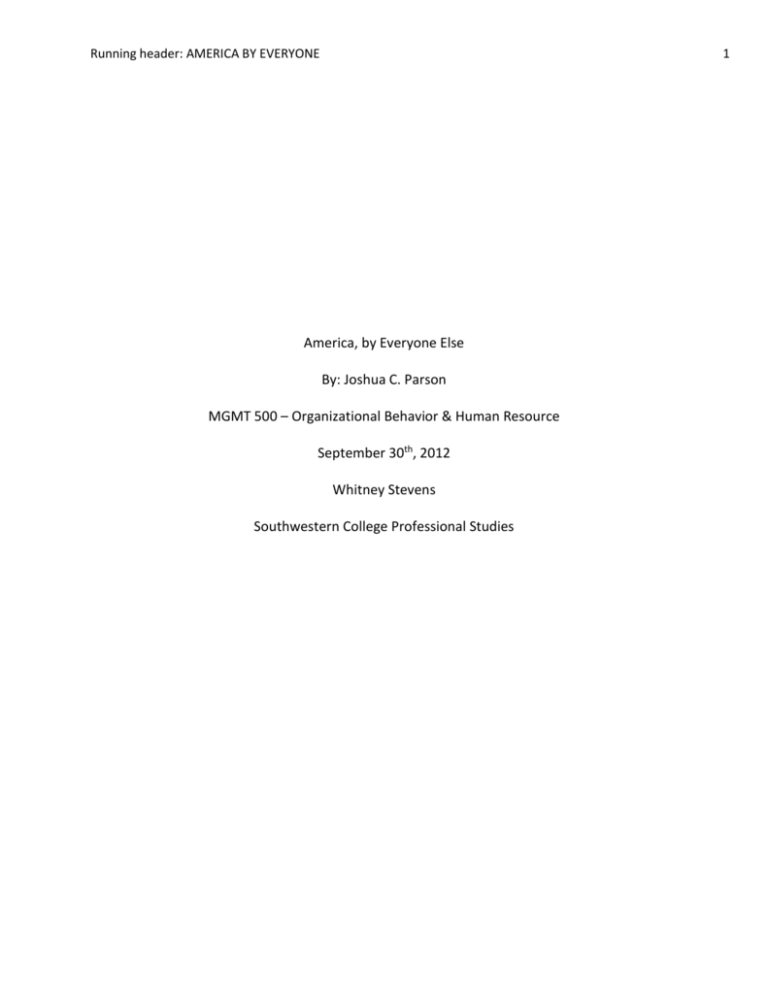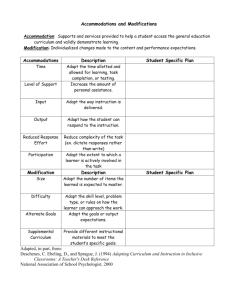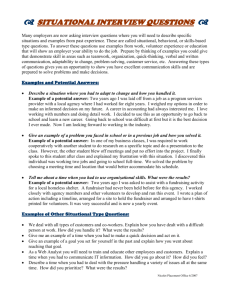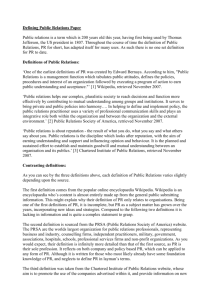File - Joshua Parson
advertisement

Running header: AMERICA BY EVERYONE 1 America, by Everyone Else By: Joshua C. Parson MGMT 500 – Organizational Behavior & Human Resource September 30th, 2012 Whitney Stevens Southwestern College Professional Studies AMERICA BY EVERYONE 2 Abstract America has the worst reputation for apathy in the world, but in business we still remain the pinnacle of performance. Many people may not understand how America’s reputation impacts our standing in the world, but the culture shock of the housing collapse and the bank bailouts began to shed light on how Americans have vulnerabilities. Having the ability to use situational leadership in different countries allows professionals to adapt to these stereotypes. Regardless of our public persona, businesses across our country strive to show that we can still work, still outperform, and still manage our workers better than anyone else in the land. This is not an easy undertaking. CNN and other 24 hour news media guarantee that every American numbskull in a YouTube clip makes international news. So the question remains, what does an American company that wants to either start or continue trading internationally do to shake off other countries opinions? The answer is situational leadership, and using the tools it provides to adapt to wherever you do business. America by Everyone Else AMERICA BY EVERYONE 3 The land of the free and the home of the brave is a memory that many Americans hold onto. However the world sees us now as the land of the lazy and the home of the apathetic. So when a relatively unknown American company grows to the point of moving onto the global scene, are they left alone to change others opinions over an introductory lunch? Turns out, others with the same concerns have banded together to break just such a stereotypical grip on our culture through proper situational leadership. Though it can't solve the U.S. obesity problem, a business group is attempting to beautify the time-worn image of the ugly American by promoting an attitude adjustment among business executives traveling abroad. The nonprofit Business for Diplomatic Action (BDA) will formally launch its program in May 2006, when it will make its World Citizens Guide available online. But the group already has distributed the consciousness-raising pamphlet to 50 or so U.S. businesses, including American Airlines, Enhanced Coverage Linking, Loews Hotels and Novell, says the group's executive director, Carl Eggspuehler. The guide politely suggests that when traveling in foreign lands, Americans generally should tone it down and dress it up, among other behavioral tips (Clark, 2006). These critiques of how we interact do not come from simple guesses as to how to “better get along” on the world stage. In man-on-the-street interviews conducted in more than 100 countries after 9/11 by the advertising conglomerate DDB Worldwide, respondents repeatedly mentioned "arrogant," "loud" and "uninterested in the world" when asked their perceptions of Americans, Eggspuehler says. "But the most consistent word in every region was 'respect.' They said we don't respect their cultures (Clark, 2006). So with the global economy becoming a staple in the business environments of today, assimilation is now at the very top of the list for CEO credentials. Companies are being forced to adapt to not only our own America by Everyone Else AMERICA BY EVERYONE 4 marketplace, but the situations of growing economies in the Middle East, India and South America. The most surprising aspect is that despite the fact that Americans have the worst social reputation; our business culture can adapt their leadership skills to the countries local customs. Where America Shines Over the past decade, a team from Harvard Business School, London School of Economics, McKinsey & Company, and Stanford has systematically surveyed global management. When it comes to overall management, American firms outperform all others. (Harvard, 2011) This could easily be due to the jump America has had on developing business practices compared to the rest of the world. It may also be the America has adapted the best cultures in manufacturing that the world can offer (Asia post WWII comes to mind) and used it to stay ahead of the curve. Regardless of all of the different variables that have caused our dominance, it may in fact be our business practices that save America’s reputation. Situational leadership is using every resource available to ensure that we continue to drive this trend in the future. The culture-focused country profiles contained in the World Business Culture website are your passport to international business expertise. (WBC, 2012) Websites like www.worldbusinessculture.com have popped up all over the largest resource used by people today, the internet. These resources are also standard teachings in the higher executive boards across every company that trades across the ponds. In any case, our representation of the company has to intertwine with our knowledge that we represent our country as well. We have a solid backing when we do business, and if used properly we may just promote our culture in a way that allows everyone to grow in business with us. Being able to adapt leadership skills to America by Everyone Else AMERICA BY EVERYONE 5 the culture allows the company to appear more educated and concerned with long term growth. These adaptations to the situation can be as simple as body language and tone all the way to dress and organizational style on group projects. America by Everyone Else AMERICA BY EVERYONE 6 References Clark, Jane April 2006 That 'ugly American' image is getting a makeover guide; who knows? It could be good for business USA Today Retrieved from http://www.lexisnexis.com.ezproxy.sckans.edu/hottopics/lnacademic/? Harvard Business Review June 2011 Why American Management Rules the World Bloomberg Retrieved from http://www.businessweek.com/managing/content/jun2011/ca20110614_682279.htm World Business Culture 2012 World Business Culture homepage WorldBusinessCulture.com Retrieved from http://www.worldbusinessculture.com/ America by Everyone Else





